In the classroom, the incentives to stay silent about the congressional hearings happening in Washington, D.C., are strong: The news piles party politics on top of gender politics on top of taboo on top of trauma. We also don’t know what happened: None of us were at the party at which Christine Blasey Ford alleges that Supreme Court nominee Brett Kavanaugh sexually assaulted her.
There’s no way we can definitively settle guilt or innocence. But there is also no way we can definitively know what experiences our students bring with them to our classrooms—or how this news is affecting them.
Kavanaugh denies these claims, which date back to his high school years. And we won’t put him on trial here. But we can’t pretend that students don’t hear our silence, and we can’t ignore one indefensible defense that has arisen. Faced with a description of what can only be called attempted rape, people—many people—have chosen to skip the question of whether an assault took place and instead ask whether what happened was really that bad.
Their argument is not about whether people are capable of change, whether crimes committed in youth should be held against one as an adult or even whether adolescents should be held to the same criminal statutes as adults. When influential figures post memes comparing sexual assault to a kid’s crush, or when a Fox News contributor tweets that the event described amounted to nothing more than “drunk teenagers playing seven minutes of heaven,” the message is clear. It doesn’t matter whether the accusations are true or not: This is just the kind of thing boys do.
This message, in its many forms, is dangerous to young people. It tells our students that attempted rape is a natural impulse. It reinforces rape culture, which Roxane Gay describes in Bad Feminist as the idea “that male aggression and violence towards women is acceptable and often inevitable.” The messages are clear: Teenage boys are naturally violent. Teenage girls don’t matter. Attempted rape is just another youthful lapse in judgment.
As educators, we cannot let these claims go unanswered. We have to push back against them.
We can do so when we show our boys we believe better of them. To begin, we can recognize that each of our students has an intersectional identity, and none can be reduced to only their gender. We can learn and teach about the ways that toxic masculinity limits and injures boys, and ensure that our classrooms provide mirrors and windows to a spectrum of masculinity. We can fight against dress code policies that suggest boys can’t stop themselves from being distracted by girls’ bare shoulders. We can refuse to offer or accept “boys will be boys” as an excuse for any behavior, and we can start courageous conversations with those who do.
We push back when we insist that all of our students have a right to physical safety. We can teach them that right isn’t contextual—their bodies are their own in school, at home and, yes, even at parties. We can speak up every time we hear comments or witness actions that suggest otherwise, and we can learn what to do if a student discloses assault or harassment.
We push back when we teach about the seriousness of sexual assault. For too long, students have been sent the message that sexual assault is a crime without consequences—an overlooked gap on the résumés of powerful men. The #MeToo movement has started to change that, but we still have a long way to go. We can create a culture of consent in our classrooms, and we can fight for sex education that speaks directly to its importance. We can consistently uphold sexual harassment policies, and we can learn how to talk about sexual assault and harassment with students.
Finally, we can push back by reminding the kids in our care that we know their power to do great things and make our society better. This year has shown the incredible capability of young people to stand up for what they believe to be right. When student activists from Parkland and local schools visited us this summer, we here at TT were reminded—unequivocally—of young people’s astonishing capacity for good.
Any suggestion that they will inevitably fail one another sells our students short. We should tell them so.
No matter the context, no matter the politics, no matter the complexity, schools cannot afford to ignore these conversations about teenagers, responsibility and sexual assault. Silence only amplifies the messages already out there. Our students are listening: It’s time to speak up.
Collins is the senior writer for Teaching Tolerance.
Delacroix is the associate editor for Teaching Tolerance.
